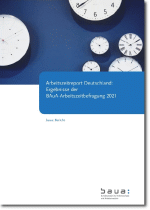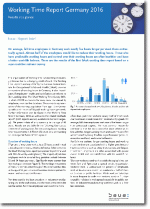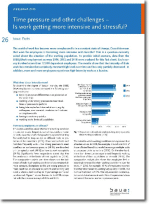Working times, health, and well-being
The organisation of working hours is one of the key issues in occupational safety and health. In view of how the world of work is changing, the flexibilisation of working time presents companies and employees with new challenges.

An important basis for the results arrived at is the Federal Institute for Occupational Safety and Health (Bundesanstalt für Arbeitsschutz und Arbeitsmedizin, BAuA) Working Time Survey (Arbeitszeitbefragung), a representative panel study. The data gathered provide information on working hours in Germany and are used to address questions about working time and how they relate to other working and employment conditions, well-being, and health.

The new baua: Report brief on working time recording provides an overview of up-to-date figures relating to this issue.
Results from the 2023 BAuA Working Time Survey reveal a rise in the recording of working times, including for people who work from home offices. The figures also show that, where employers refrain from recording working times, this is increasingly associated with temporal boundarylessness, worse ability to switch off from work, less time flexibility, and employees who are more dissatisfied with their work-life balance.
Flexible working hours, telework, remote and mobile work
- Forms of work that are flexible in terms of working time and workplace (remote work, mobile work) offer great opportunities for employees and companies. They are also associated with risks, for example with regard to boundaryless work or loss of innovation.
- These forms of work are subject to the Occupational Safety and Health Act (Arbeitsschutzgesetz, ArbSchG) and the Working Hours Act (Arbeitszeitgesetz, ArbZG). Employers are responsible for occupational safety and health, as well as the organisation of working hours in ways that promote good health.
- However, flexible working is also linked to employees' growing invisibility. Employees increasingly have to plan and organise their work themselves..
Flexible Working Time Patterns
Location-flexible Working
Shorter working times, working time preferences, and the four-day week
- Many employees normally work five days a week with a contractual weekly working time of about forty hours.
- Some employees, particularly those in full-time positions, would like to reduce their working times.
- If working times are redistributed or shortened, it is necessary to avoid long working days. Furthermore, it may be necessary to implement organisational changes.
Working time models
- There is great potential in the design of flexible working time models, both for companies’ productivity and their employees’ health, satisfaction, and work-life balance.
- The development and introduction of a working time model is very challenging due to the numerous design parameters, the wide variety of models, and the conflicting goals of employer and employee representatives.
- Visit our Working Time Models page to learn about the findings and recommendations from working time research. We have simplified the information, making it clear and accessible as we describe different working time models.
Atypical working times, night and shift work
- Some employees in Germany work at atypical times, for example at weekends, at night, or in shift work patterns. There are many reasons for this. These include, for example, ensuring services are provided for the public (e.g. by the police force), but there may also be technological or economic motives (e.g. at production facilities).
- Night and shift work place high demands on employees' health and social lives. Due to these risks, the Working Hours Act stipulates that the working hours of employees working at night and in shifts must be determined in accordance with the established scientific findings on the humane organisation of work.
- Atypical forms of working time such as on-call work, on-call duty, and standby duty can also be highly demanding for employees. Employer-orientated flexibility often leads to a reduced ability to plan and predict working hours, especially if they change at short notice.
Organisation of Night and Shift Work
Atypical Working Time Patterns
Recording of working times
- The recording of working hours is important for occupational safety and health, making it possible to measure exposure to work-related stress and avoid temporal boundarylessness.
- According to rulings from the European Court of Justice, employers have to implement a system to record their employees’ daily working times.
- For employees, the recording of working time allows overtime to be recorded and compensated for with time off. This also opens up opportunities for employees to take more control of their working times, for example under flexitime arrangements.
Risk assessment of working times
- The framework for the organisation of working hours is defined in the Working Hours Act, but also in the Occupational Safety and Health Act as an issue for risk assessment. The organisation of working time is explicitly mentioned as a factor to be assessed in Section 5 of the Occupational Safety and Health Act .
- Visit the Risk Assessment of Working Times page or download the Working Time Checklist (German) to assess and evaluate the quality of working time models.
- Further information will be found on the Risk Assessment page.











